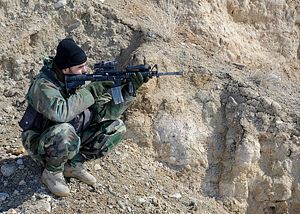The former spokesperson for the Tehrik-i-Taliban Pakistan (TTP), Azam Tariq, was reportedly killed in airstrikes conducted by Afghan and NATO forces Saturday night. The operation took place in Bermal district of Paktika province.
“We can confirm that U.S forces conducted two air strikes recently in Bermal district on September 24 and 25. I can tell you that one air strike was conducted under counter terrorism authorities and the other airstrike was conducted in defense of friendly forces,” the U.S. military claimed in a statement to Voice of America.
The Afghan Ministry of Defense also claimed to have killed 9 other militants in operations in Bermal district that included two Al-Qaeda commanders.
Azam Raziq was considered a senior leader of Tehrik-iTaliban, ranked 4th most important TTP with a $200 thousand U.S. dollar bounty on his head by Pakistani authorities. Raziq’s real name was Raees Khan.
For his first act as spokesman, Raziq claimed responsibility for the suicide attack in 2009 that struck a border gate at Torkham near the Afghan border that killed 22. “We claim responsibility for the blast. This is our first response since the death of our chief Baitullah Mehsud. We will continue similar attacks in the future also,” Tariq said.
In 2014, Azam Raziq broke with the main faction of the TTP along with Commander Khan Saeed Sajna. Azam Raziq operated as Sajna’s advisor, who was reportedly killed in a U.S. drone strike earlier this year.
The splinter faction accused TTP leader Mulla Fazlullah of “baseless” propaganda against the Afghan Taliban, and having supported criminal organizations.
Afghan officials claimed that the killing of the senior TTP leader was proof that the Afghan government was not harboring terrorists. “Killing of top TTP commander, Azam Tariq, in an operation by Afg security forces in Paktika is yet another proof that Afg is not in business of harboring terrorists as ‘assets’, regardless of who they intend to target; and does not distinguish between ‘good’ and ‘bad’ of them,” Afghan Ambassador to Pakistan Dr. Omar Zakhilwal said.
Paktika province has witnessed a recent spate of violence over the last couple months. In September, Omna district of Paktika province fell to militants associated with the Haqqani Network. The fall of Omna district came days after the collapse of Jani Khel district in neighboring Paktia province. With news of the death of a senior TTP leader in Paktika and several Al-Qaeda commanders, it would appear the province is currently host to a plethora of deplorable groups and actors. The province’s location near the border to Pakistan makes it an attractive region to actors that wish to destabilize the Kabul government.

































